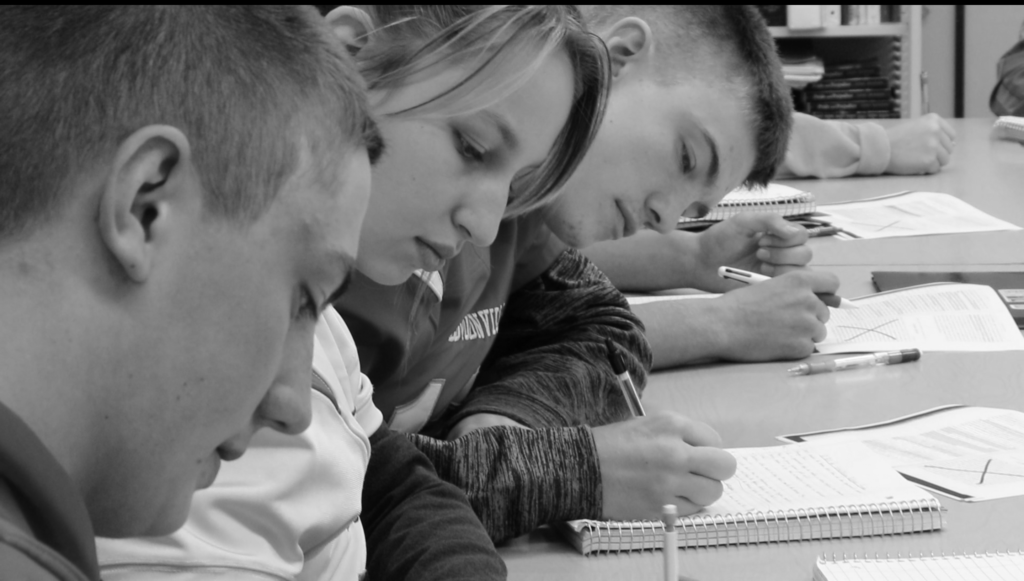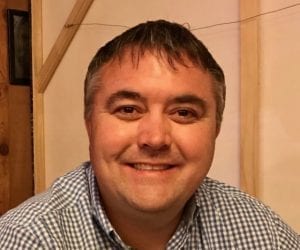Helping Young Americans Find a Voice...and Responsibility
April 16, 2021

“We live in a strange time,” says Royce Aldridge, a high school history teacher in Yerington, Nevada. “What a weird time for adolescents trying to find their own identity. The coronavirus, the political climate . . . . It’s all very confusing.
“Still, the more I study history, the more I realize that every time has been strange.”
Prompting students to seek historical answers for “why things are the way they are” is Aldridge’s daily challenge. He’s a “pied piper” to the freshmen who take his World History course and, two years later, reappear in his classroom for US History. He tries to “play the right tune” so they will follow.

Yerington, which lies 71 miles southeast of Reno, is small and rural. Over a third of Aldridge’s students are Latino, many of them first-generation Americans. Another quarter are Native American; Yerington High School serves two Indian reservations. Aldridge himself descends from the Gros Ventre tribe on his mother’s side. She grew up on the Fort Belknap reservation in Montana. “I’m the only minority teacher at the school,” Aldridge says. This gives him an “immediate in” with many students. Latino students gravitate toward him. Native American students trust him, “because I understand reservation life,” Aldridge says.
Still, he competes for their attention amid the distractions of social media and the lure of $27/hour jobs at a nearby mine, where the nation’s largest copper ore deposit was recently opened. He encourages students to go to college. “It’s great to make that money, but what are you going to do when your back doesn’t hold out anymore, and you’ve got two kids and a mortgage? Get some education to fall back on.”
Meanwhile, Aldridge tells students history’s strange and moving stories. He takes them inside the stories, imagining the challenges earlier Americans faced.
Ashbrook Seminars Reveal the Power of Primary Documents
In this work, Aldridge has been inspired by Ashbrook’s Teaching American History seminars. They’ve encouraged him to teach from primary documents that capture the authentic voices of the past. Earlier in his 18-year career, primary documents “totally intimidated” him. Then he attended a multi-day weekend seminar in Philadelphia on The Federalist. “I had read a few of the Federalist papers before, but this time, knowing that I would have to answer to one of the experts in the field”—Professor Jeremy Bailey of the University of Houston, who led the seminar—“I decided it was time to really buckle down and read the course pack carefully. I found myself fascinated by the language, by sentences like, ‘If all men were angels, there would be no need for government.’ People don’t speak that way anymore,” he says. “Maybe they never did. But seeing that they wrote that way really opened a world for me.”
After each Ashbrook seminar he’s attended, Aldridge has returned home “pumped up and alive, ready to engage my students with new material and perspectives.” A seminar in Valley Forge left him an awed admirer of our first president. The facilitator, Professor Bill Allen, chose documents to reveal not only Washington’s view of the Revolution and founding, but also his character. The last document, Washington’s last will and testament, “seemed a strange assignment—until I read it. The third paragraph, the longest in the will, dealt with provisions to free and provide for his slaves. . . . He left a pension to his aged and infirm manservant, provided a pension for others who were unwell, and provided for the education of those who were children at the time of his death.”
How a History Teacher Discovered His Vocation
Aldridge did not begin his career as a history teacher. After a successful first semester at the University of Montana, he felt restless and uncertain about the major he should choose. So he left to join the Air Force, following the military path his own father took. He could not adapt to the military’s culture of unquestioning obedience (“I frustrated my first sergeants, and peeled more potatoes, because I asked ‘Why?’”). Yet he learned disciplined habits. Returning to the university, he found himself better able to focus, especially after a diagnosis of dyslexia explained the learning challenges he’d worked through. He double majored in English and history with an emphasis in secondary school education. Wondering whether his dyslexia would put off high school principals, he realized he could turn his disability into an advantage. Both Aldridge and his wife Mandy (herself an English teacher at Yerington High) earned Master’s degrees qualifying them as reading specialists.
While teaching English for 13 years, Aldridge remembered the fascinating stories his college history professors told and began devouring popular histories. When a social studies position opened at Yerington High, he took it.
Now his reading specialist training helps him guide students through key texts like the Declaration of Independence. “We spend two class periods dissecting it,” he says. Students identify key words in the first two paragraphs and consider why those words were chosen. Arriving at the list of charges against King George III, Aldridge asks students to reword each accusation as concisely as possible. He likens this exercise to the “six-word memoir” writers use to sharpen their skills. He has not entirely forgotten his language arts training.
He also uses documents to arrest students’ attention.
“I love reading Lincoln’s speech at Independence Hall aloud to students,” Aldridge says. On the way to his first inauguration, Lincoln stopped in Philadelphia. He declared that the principles of the Declaration, which motivated the Revolution, would guide his presidency, concluding, “I was about to say, I would rather be assassinated on this very spot than surrender [those principles].” After reading that line, Aldridge pauses, waiting for it to sink in.
Studying Lincoln’s Decisions . . . To Understand His Greatness
He admits to a “hero-worship” of Lincoln. Yet as he begins teaching about him, “I first try to tear him down to a human level. I say, ‘Look at this gaunt man with rudimentary education. Why would we ever put him on such a pedestal?’” Some students nod in agreement. Others protest. “Eventually, one of the kids will call me out. When you look at my classroom, there are more pictures of Lincoln on the walls than of anything else.
“Then we start building Lincoln back up. We read excerpts of the Lincoln-Douglas debates. We look at the five preceding presidents, none of whom were reelected even though none dared to touch the slavery issue. Then we look at the election of 1860 and Lincoln’s first days in office. I say, ‘If things go to pieces, Lincoln will go down as the worst president in US history: the guy who ripped the country in half! So, let’s talk about the decisions he has to make. Should he resupply Ft. Sumter?”
By the time students read Lincoln’s Emancipation Proclamation, they think so well of him that that they can’t believe Lincoln wrote the provision allowing any state that came back to the union before January 1, 1863 to keep its slaves. “You wrote this,” they say to Aldridge, “he didn’t write this!” Aldridge assures them, “This is the real document.” Then he explains the political context. Union forces had won few victories, and casualties were shockingly high. Irish Americans opposed to the draft rioted in New York City. Still, Lincoln decided to emancipate the slaves in the rebelling states, telling them, “This will be your punishment if you don’t rejoin the union. And he knew they wouldn’t,” Aldridge said.
He continues, always putting Lincoln’s decision-making in context. Lincoln proposed the 13th Amendment after asking Frederick Douglass’s advice—and after the win at Gettysburg. “For someone who had not even thought about emancipation three years earlier, to now ask for a constitutional amendment emancipating all the slaves was a huge evolution. Can you imagine the political pressure he felt while rounding up the votes for it?”
Helping Students Find a Voice … and Their Responsibility
Aldridge’s questions engage students in history’s ethical challenges. “They want to be engaged,” he says. “Everybody wants to have a voice.” He tells students they also have “a responsibility” to preserve the gift of self-government. “This gift is very fragile.” Protecting it requires careful attention to facts. “Go to the real source, not the secondary source,” he advises. “You heard that on the news, but did you listen to the whole interview, or to just one snippet” chosen to provoke a reaction?
He emphasizes that what unites all Americans is a common pursuit of opportunity. Yet preserving this common ground means addressing the barriers to opportunity some citizens face.
“We’re still in a post-Reconstruction world. Why can’t we figure this out?” Aldridge asks. “Why does Supreme Court Justice Clarence Thomas hide his law diploma, lest others think he got the opportunity to go to Yale only because of the color of his skin? He still had to do the work! Instead of being ashamed of how we got the opportunity, why not create more opportunities for more people?
What a Good Teacher Does
Some students opt to do what he himself did: join the military. When they do, Aldridge gives them a challenge. “You’ll be asked to swear an oath to defend the Constitution with your life. Before you do, read it.” Aldridge himself first read the Constitution after he was sworn in, after his father took him to lunch and challenged him, “Would you do it? Die for the Constitution?”
“I was 18 years old and sure of myself. I said I would. ‘Have you ever read it?’ he asked. I went home and read it. Years later, after I’d begun teaching, I told Dad what he’d prompted me to do. I still would die for it, I said. Would he? He’d spent 22 years in service.
“‘Son, I never read it,’ he replied. ‘But that’s what a good teacher does, huh? Makes you think?’”
Aldridge laughs. Each generation gives something to the next. Our task, he says, is to give those who follow us more opportunity—and more education in how to use it.

